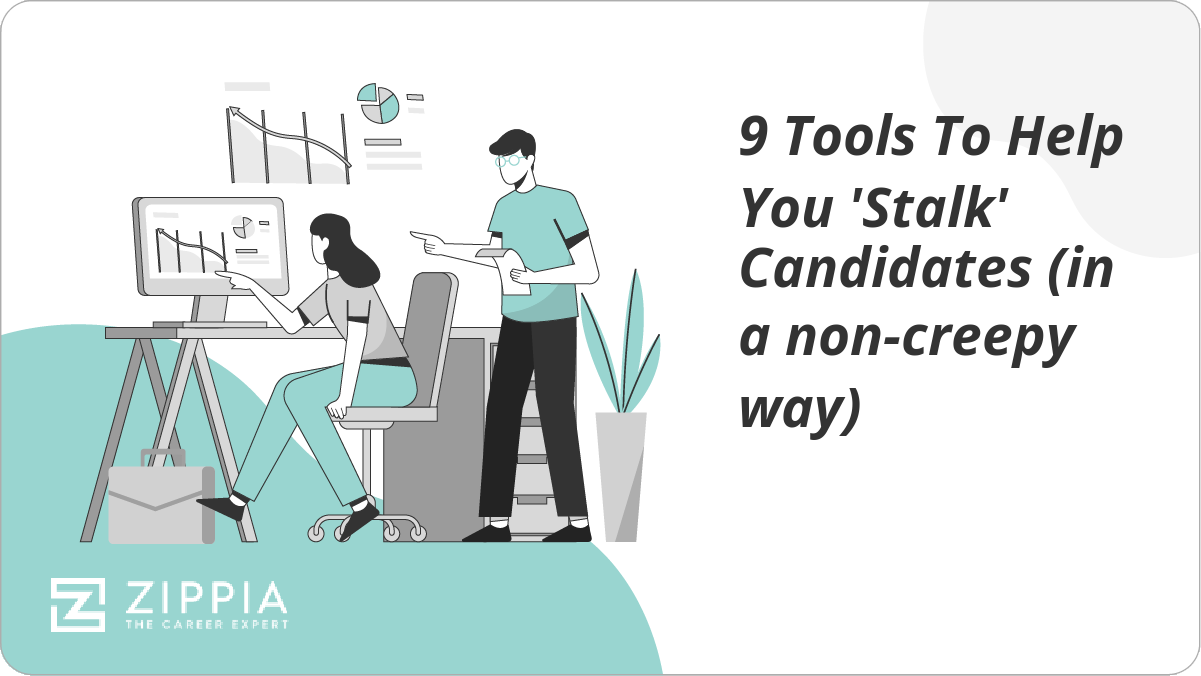Thanks to social media, there is now a plethora of information available to use to research job candidates.
Here are seven tips to help you quickly learn about the best practices in researching candidates on social media. Use these seven tips to research candidates efficiently and avoid the risk of being accused of privacy violation or discrimination.
Key Takeaways
-
60% of employers use social media to research potential candidates.
-
Take notes and screenshots if you find any red flags that will influence your hiring decision.
-
Wait to research candidates until after their interview to avoid even the appearance of discrimination.

The Rising Popularity of Researching Potential Candidates on Social Media
CareerBuilder recently surveyed more than 2,000 hiring managers and HR professionals, revealing that 60% of employers use social networking platforms to conduct research on their potential candidates.
That should come as no surprise.
The percentage of recruiters interested in learning more about candidates via social media prior to inviting them in for an interview is on the rise. Last year, the same survey showed 52%. Consider that when the survey was first conducted in 2006, only 11% of hiring managers declared an interest in candidates’ social profiles.
The number of employers using social media to research candidates rose by 500% during the last decade. Moreover, 59% of recruiters admitted that they also use search engines for candidate research. Again, that’s a rise from 51% noted last year.
If you’re a recruiter or HR professional who wants to stay on top of your game, this data makes it clear that the internet is on its way to becoming a critical source of candidate information. And that’s especially true if you’re hiring for sectors like IT or sales, where 75% and 65% of hiring managers, respectively, admitted to screening candidates on social media.
7 Tips for Researching Your Potential Candidates
-
Document Your Work
Let’s say that you check out a candidate’s Twitter profile and find some tweets where they bad-mouth their employer or colleagues.
To make your selection process more transparent, you should take a screenshot of the content and then document how it influenced your decision.
That way, if anyone wants to challenge your decision, you’ll be able to provide them with clear evidence before the candidate potentially deletes this content from their profile.
Here are some examples of content that should raise a flag:
-
Inappropriate pictures, information, video, comments
-
Negative posts about the candidate’s previous workplace
-
Information about drinking or drug use
-
Discriminatory comments about religion, race, or gender
-
Poor communication skills
-
-
Never Ask Candidates for Personal Account Information
If a candidate has made their profile invisible to the public to protect their privacy, you should respect that. Under no circumstances should you ask them to reveal this content to you. That would be not only a violation of their privacy, but a serious risk to your reputation as an employer.
Four American states explicitly forbid employers to ask for candidates’ social media passwords and usernames, in violation of the Federal Stored Communications Act.
A number of other states have such laws pending. Experts predict that at some point Congress will pass a regulation that will forbid that practice on a federal level.
A few years ago, The University of Kentucky paid $125,000 to settle a discrimination case following a claim made by a university professor whose application was not considered because of views about evolution that he included on his personal website.
If your candidate chooses to share social content in the public domain, it shows that they’re responsible and are aware of the risks of sharing too much information about themselves on social media.
-
Consider Waiting Until After the Interview
This might sound counter-intuitive, but recruiters (internal, external or independent) can easily be accused of discrimination.
If a candidate belongs to a protected group, you may easily learn about it when checking them on social media. And if you then decide not to invite that person to the interview, you risk being accused of discrimination.
That’s why it makes sense to wait until after the interview has taken place before you conduct your research.
-
Handling Negative Comments About Your Candidate
The web is full of content created by anonymous users who take no responsibility for their words.
If you spot other people posting negative information about your candidate, take their words with caution. As a recruiter, you stand no chance to learn about the context of these comments, so better let them go and assess the candidate on your own.
-
Make the Most of LinkedIn and Other Professional Networks
LinkedIn is a treasure trove of candidate information.
Not only can you check a candidate’s profile, but you can also check their blogs, publications, professional networks, and any key updates to their pages. A great LinkedIn profile is a sign that your candidate takes proper care of their personal brand.
All LinkedIn members have a public page, but connections gain access to even more information. If you found a perfect candidate, connecting with them is the first step to building a relationship – and it matters a lot.
-
Learn More About Candidates From Their Blogs
Most jobs require solid communication skills. You can easily learn about a candidate’s written or verbal communication skills through their social media footprint, but nothing offers a better look into their communication skill set than a blog.
Personal blogs can serve as valuable sources of information about the candidate’s general communication skills, as well as their personality, interests, and network.
Google the candidate’s name and you might spot their blog. You can also ask candidates to submit their blog URLs as part of the application process.
-
Researching Candidates on Social Media
Social networks like Facebook, Twitter or Instagram allow recruiters to learn about a candidate’s professional and personal life like never before.
You can legally look at a candidate’s public social media profiles, but some smart job seekers know how to polish their online presence to make a great impression on recruiters checking out their profiles.
When researching candidates on social media, proceed cautiously and seek legal advice whenever you’re in doubt. Be consistent in your research methods to ensure fairness in the process.
And don’t forget that candidates will be researching you as well!
Researching Job Candidates FAQ
-
How do you research potential employees?
You can research potential employees by searching their names on Google, looking at their social media profiles, and looking at their LinkedIn pages.
A quick Google search will bring you to the candidate’s publications, blogs, and any other articles they’re mentioned in.
You can also look at their social media profiles (if they’re made public) and their LinkedIn profile, which should connect you with additional resources.
All of this information can go a long way in helping you get a better idea of what the candidate has accomplished, and it will quickly bring any major red flags to your attention.
What is the best way to find candidates?
The best way to find candidates is on job boards or through referrals from current employees.
Most job seekers will be looking for work on job boards, so make sure your position is listed on these websites.
In addition, referrals from your current employees can also be highly valuable, as these candidates come with built-in references.
To help encourage employees to refer their friends and past coworkers, set up an incentive program that gives bonuses to employees whose recommendations result in a good hire.





